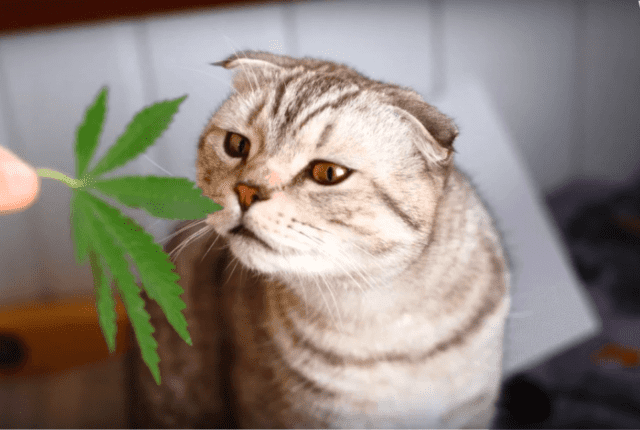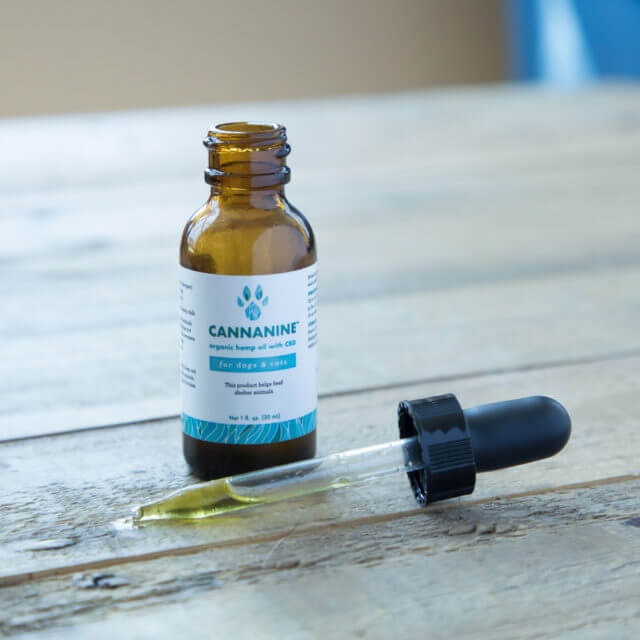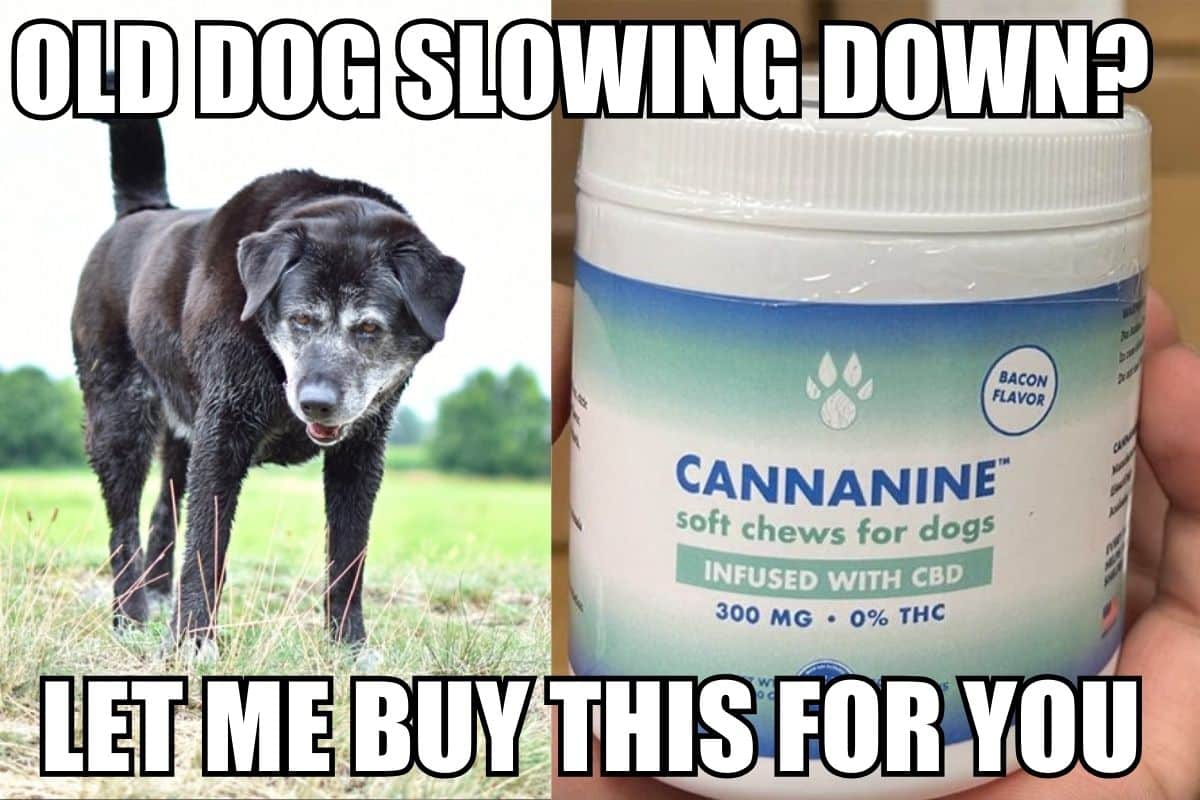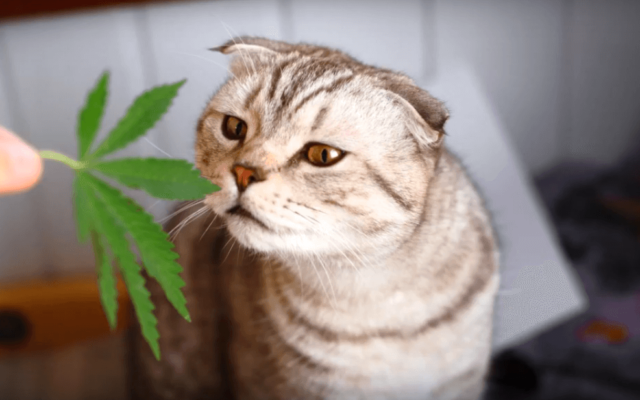
The Ultimate Guide To CBD Oil For Cats
CBD Oil For Cats Peeing, Urinary Tract Infections, Appetite & More
Table of Contents:
1. Introduction To CBD Oil For Cats
2. The Endocannabinoid System & Your Cat
3. Why Do Cat Owners Use CBD Hemp Oil?
- Discomfort
- Gastrointestinal Issues
- Asthma
- Chronic Upper Respiratory Infections
- Bladder Issues
- Appetite Stimulation/Nausea Reduction
- Calming effects
4. Will CBD Oil Make My Cat High?
6. What Scientific Studies Have Been Done on CBD Oil in Cats?
7. What Side Effects or Risks Are Involved with Giving CBD Oil to My Cat?
8. What Dosage of CBD Oil Should I Give My Cat?
9. How Long Before CBD Oil Starts Working for My Cat?
10. How Do I Choose a Quality CBD Oil Product for My Cat?
11. Which CBD Product Does iHeartCats.com Recommend?
12. A Real Cat Owner’s Experience with CBD Oil
Introduction To CBD Oil For Cats
CBD oil for cats has become the go-to option for pet parents searching for natural support for healthy mobility, calmness, immune support, and more. Unlike many pharmaceutical drugs, CBD is relatively free of side effects and causes no long-term damage to the body.
CBD stands for Cannabidiol. It is one of more than 60 compounds known as cannabinoids found within cannabis plants. There are many strains of cannabis, but marijuana and hemp are the two most commonly utilized by humans. Marijuana is known for its psychoactive properties and ability to give users a “high.” Hemp, on the other hand, is most commonly used for industrial and therapeutic purposes. CBD oil is derived from this safer, more medicinal strain.
Most cannabis plants contain both CBD and THC (tetrahydrocannabinol), the high-inducing compound in marijuana. The difference is that while marijuana typically contains anywhere from 2.5% to 25% THC, most commercial CBD products contain less than 0.3%. THC amounts this low is merely considered trace quantities. They are entirely benign and incapable of producing a high.

We are not the first human civilization to recognize and utilize hemp for medicinal purposes. In fact, it has been used to soothe a variety of ailments for nearly 1,000 years. Holistic doctors and veterinarians are still exploring the many ways CBD hemp oil can benefit humans and animals alike. While most of the research has focused on humans, dogs, and laboratory animals, several organizations are beginning to explore clinical trials in cats.²
Despite the lack of scientific data, holistic veterinarians and cat parents are singing the praises of CBD hemp oil as a natural and effective treatment for a growing list of issues in cats.
The Endocannabinoid System and Your Cat
All mammals and many other animal species have an endocannabinoid system (ECS) which is an interconnected chain of receptors found in the brain, nervous system, glands, and organs. This system controls health and healing by acting as a command center and maintaining balance within the body.³
CBD oil produces therapeutic effects in the body by stimulating the endocannabinoid system to promote overall healing and wellness. It helps naturally regulate the system to maintain ideal balance and influence many internal processes related to discomfort, mood, sleep, and immune function.
Why Do Cat Owners Use CBD Oil?
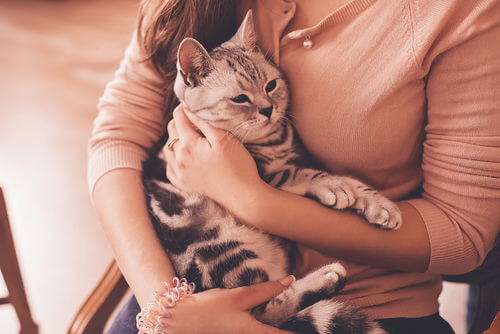
Studies have demonstrated CBD’s ability to promote calmness and improve overall well-being. In addition to its many medicinal benefits, CBD is also quite safe for cats as long as it contains little to no THC. It may even help improve your cat’s mood, skin, coat, and energy levels.
According to Dr. Gary Richter, a veterinarian based in Oakland, CA:
“Almost anything that cannabis would be used for in a human, from a medical standpoint, has the potential to be equally as valuable in dogs or cats. Discomfort, gastro-intestinal related things, stress, you name it. We’ve seen the benefits in all of these areas. “4
Below we will discuss some of the most common cat conditions treated with CBD oil by veterinarians and feline caregivers.
CBD Oil for Discomfort in Cats
While there are several medications for the treatment of discomfort in dogs, there are only a few approved for the delicate systems of cats. This is one of the reasons veterinarians and cat parents are so enthusiastic about CBD oil. Rather than using steroids or NSAIDs that carry severe side effects, they are turning to all-natural CBD for relief of joint discomfort, nerve conditions, injuries, and illnesses.
A group of researchers from the University of London even believe CBD is powerful enough to qualify as a new class of drug for aiding in comfort.5
Joint discomfort is one of the most common issues in cats. It occurs when the cartilage in a joint wears away, allowing the bones to rub together painfully. Although diagnosed more frequently in dogs, our feline friends can definitely suffer from sore joints. Not only do cats visit the vet less often than dogs, but they are also experts at hiding their discomfort.
Our pets should never have to suffer in silence. Using CBD oil in cats that are older, overweight, or have symptoms of joint discomfort can help tremendously.
CDB Oil for Gastrointestinal Issues in Cats
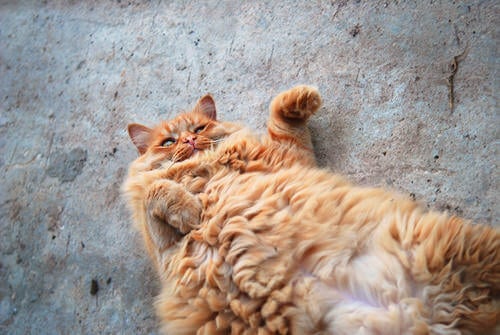
Many cats suffer from gastrointestinal problems. Many holistic vets recommend CBD oil for their felines for discomfort, vomiting, diarrhea, poor appetite, and weight loss.6
CDB Oil for Breathing Issues
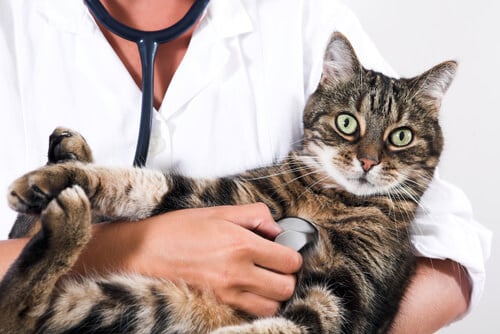
CBD may be a great option to reduce bronchial issues, lessening the number of asthma attacks. During an asthma attack, those airways constrict and drastically reduce the amount of air that gets to the lungs.8 These attacks can be minor or may become life-threatening. Many cats are reliant on inhalers and/or nebulizers.
With its properties, CBD may be a great option to help decrease the number and severity of breathing issue a cat experiences.
CDB Oil for Chronic Upper Respiratory Infections
Many cats suffer from life-long viral infections causing symptoms like chronic congestion, sneezing, and itchy, runny eyes. Veterinarians and pet parents have been delighted to discover that feline patients taking CBD oil for other ailments have had the wonderful “side effect” of reduced URI symptoms.²
CBD Oil For Appetite Stimulation & Nausea Reduction
Cats are finicky eaters even when they are feeling their best, so it is no wonder they often stop eating when sick or stressed. Unfortunately, many can only go a few days without food before their liver becomes affected. Whether battling an illness, undergoing chemotherapy or dealing with a stressful life event, it is imperative that cats take in the nutrients they need to maintain their strength.
Cannabis is known to stimulate appetite and suppress nausea in humans. This is why it is often prescribed to people battling chronic illnesses. According to Dr. Stacy Kerr, MD, CBD interacts with the body’s serotonin receptors and can be more effective at relieving nausea than prescription pharmaceuticals.10
CDB Oil for Calming Support in Cats
Some cats suffer from chronic stress while others experience it only situationally. Either way, stress can cause behavioral issues like urinating or defecating outside the litterbox, aggression, or destructive scratching. Even worse, some cats become physically ill as a result of their stress, refusing to eat, or experiencing vomiting or diarrhea.
For these kitties, CBD may help supplement the endocannabinoid system by altering serotonin signals. Seratonin is a hormone that helps regulate mood. CBD is thought to affect how the brain reacts to serotonin, much like many prescription antidepressants.11
Will CBD Oil Make My Cat High?
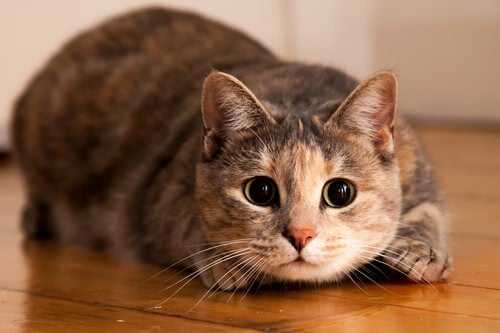
The short answer to this question is, no, CBD oil cannot and never will make your cat high. Only substances with a significant amount of THC can cause a psychoactive effect. Unlike marijuana, hemp contains only insignificant traces of THC. The quantity of THC varies widely in different strains of marijuana, but hemp-derived CBD oil contains less than 0.3%. Since cats are quite sensitive to THC, we recommend purchasing a CBD product where 100% of the THC has been removed.
Is CBD Oil for Cats Legal?
Yes, CBD oil derived from hemp is legal in all 50 states as long as it contains 0.3% THC or less. Since most CBD oil from hemp contains little to no THC, it is not regulated in the same way as marijuana. However, the complex legal status of marijuana often leads to confusion and frustration, deterring pet owners from taking advantage of CBD oil.
Related: Compare Pet Insurance Plans
The important thing to remember is that as long as the CBD oil comes from hemp and contains no more than 0.3% THC, it is completely legal to purchase and possess in every US state.
What Scientific Studies Have Been Done on CBD Hemp Oil in Cats?
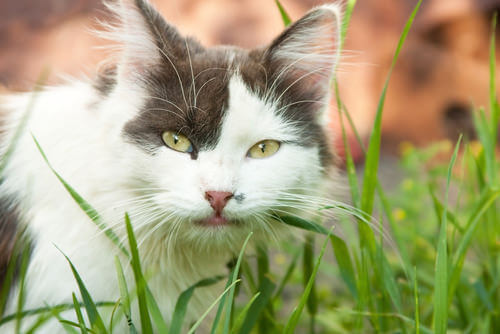
Unfortunately, there isn’t much data when it comes to cannabinoids and cats.13
Only one company is known to have performed a long-term clinical and pharmacological study on cats, but another study is coming in 2021-22 by Cannanine and 3rd party partners. The existing study which used its own hemp-based products may have been falsified. Otherwise, the available data primarily focuses on the toxicity of accidental cannabis ingestion in cats.
“Cats are absolutely not small dogs,” Amanda Howland, founder of ElleVet says, “and they metabolize things very differently. Cats can’t take any of the drugs that dogs take for pain. Their livers just don’t tolerate it.” If a human tries to help an ailing cat by giving it a canine discomfort reliever, “they can get very sick. There are very few discomfort options for cats that are safe. So we did a long-term safety study to determine that [our products] are safe for cats.”
The ElleVet researchers found that when it comes to promoting calmness, cats respond even better to cannabinoid medicine than dogs. They also saw promoted comfort from joint discomfort and other problems. They currently have a discomfort study involving solely cats in progress and plans to study whether lowering stress levels with CBD helps improve chronic bladder issues.13
Despite the lack of published date, Dr. Gary Richter notes that countless vets and cat owners have seen the benefits of CBD in pets firsthand.
“While I am certainly a person who’s a proponent of the research,” he says, “just because the research isn’t there doesn’t mean you can or should ignore something that’s completely obvious and right in front of your face.”
Dr. Richter recommends its use for his feline patients and suggests interested cat parents consult their own vets for advice.13
Related: Which brand of CBD oil is endorsed by iHeartCats.com?
What Side Effects or Risks Are Involved with Giving CBD Hemp Oil to My Cat?
The most common side effect cat owners report is sedation. Nausea, vomiting, changes in appetite, or stress could potentially occur if the cat has a bad reaction, but these cases are rare and usually very mild.6
In fact, Dr. Krause of Boulder Holistic Vet says she often sees a reduction in stress in her feline patients.
“The most common side effect I have seen in my patients is increased appetite and decreased stress. Some animals can become sedate on CBD products. CBD can promote relaxation and some animals are more sensitive than others.”
She recommends:
“If you notice your cat has become too sedate, stop giving the product and work with your veterinarian. Allergic reactions are always possible. Some cats that are allergic to grass can also be allergic to cannabis. This is rare but is a possibility.”²
In addition, many veterinarians and pet parents have actually reported positive side effects. For example, they begin using CBD to help their cat cope with joint discomfort.
What Dosage of CBD Oil Should I Give My Cat?
It is not possible to overdose on CBD as your cat’s body will just release the excess in his or her waste. However, when first introducing CBD oil to your cat, it’s best to start out slow. This will help you pinpoint the perfect dose for your individual pet without shocking the system or causing adverse reactions.
While you should always consult with your veterinarian regarding dosage, a general rule of thumb for cats is 1mg to 5mg for every 10lbs of body weight. From there, you can increase the dosage until ideal effects are achieved.6
The key to dosing is finding a balance where the cat reaps all the benefits without experiencing side effects. If you notice any adverse reactions after administering CBD to your cat, discontinue usage immediately and consult with your vet before continuing.
You may find it necessary to increase the dosage over time to maintain the same level of benefit. Be sure to make these changes slowly and gradually to give the cat’s body time to adjust.
How Long Before CBD Oil Starts Working for My Cat?
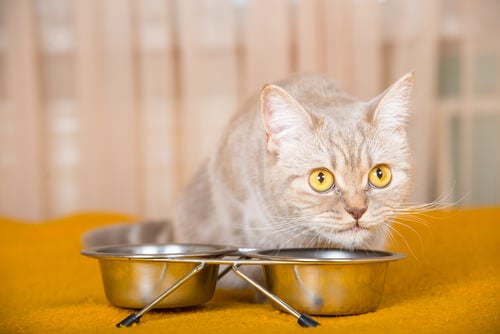
Every cat responds differently to CBD oil, but in general, you can expect the following response times:
- When giving CBD directly into your cat’s mouth (sublingually) – Allow 20-60 minutes
- When giving CBD in your cat’s food – Allow 45 – 90 minutes
Note: When treating chronic issues, you may not see optimal results until 2 to 4 weeks of steady use.
How Do I Choose a Quality CBD Oil Product for My Cat?
There are several factors to consider when choosing a CBD hemp oil product for your cat. Quality tinctures should include a certificate of analysis (COA) showing the results of laboratory analysis performed on the product. Ideally, the certificate should show high amounts of CBD and very low THC, if not none at all, as in Cannanine™ Organic Full Spectrum CBD Oil from Hemp.
Cannanine is non-GMO and made from human-grade ingredients including organic Colorado hemp. It contains absolutely no THC, so it will never give your cat an uncomfortable “high.” Laboratory test results show Cannanine is also free of heavy metals, harmful bacteria, yeast, mold, and other toxins.
All Cannanine products are maximized for bioavailability and absorbability by utilizing a patented nano-sized microemulsion with particles four times smaller than liposomal emulsions.
To learn more about choosing a high-quality, therapeutic CBD hemp oil product, view our Buyer’s Guide.
Which CBD Product Does iHeartCats Recommend?
We worked hard to create the Cannanine brand of CBD Oil. In addition to containing nano-sized emulsion (best for absorption), the formula is 100% THC free, which is relatively rare but very important for animal use. In addition, each and every purchase provides healthy meals for shelter pets through our partners at GreaterGood.org!
A Real Cat Owner Shares Her Experience with CBD Oil
Zaphod was a 14-year-old kitty suffering from many of the common problems that plague senior cats. According to his owner, Kiki Kane:
“In the last two years, he has lost his purr, his eyesight, and his ability to comfortably jump, pounce, play, and recently, even cuddle.”
Kane also describes increased irritability, circling, nighttime wandering, and other symptoms of age-related cognitive dysfunction. She added CBD oil to Zaphod’s medication protocol and noted that it “relaxed his facial expression and let him feel comfortable being picked up, held, or petted.”
While CBD did not completely resolve Zaphod’s night restlessness, it did allow Kane to carry him to bed with her, where he would fall asleep on her chest.
Sadly, Zaphod passed away, but Kane wrote that CBD oil allowed her to “offer a little more comfort as the light continued to fade.”15
More Testimonials of CBD for Cats from iHeartCats.com
iHeartCats.com polled their Facebook page with the following question: Have you given CBD oil to your cat? What was your experience? The following are some of the responses received:
“My eldest cat suffers from Feline Hyperesthesia. She chews on herself and is very hyper sensitive, doesn’t like to be bothered by the other cats. I started giving CBD oil in her milk every day, 2 drops. I’ve noticed significant changes within the first week. She doesn’t chew on her legs to the point of creating sores anymore and her fur is slowly growing back. She’s still her ornery self, but tolerates being around the other cats now.” – Tiana Carrigan
“I have been giving my senior cat the CBD drops since November. Huge improvement in his mobility, appetite and bathroom habits.” – Althea AJ Davis
“My 18 year old male cat had bad joint discomfort. I started him on 250 4 drops a day and within a few days, we noticed he stopped limping, which is what he has been doing the last 2 years during the fall and winter months. I am pleased to announce that Junior now chases his other cat sibs and sleeps much better. He won’t live forever, but this old fella is sure feeling better!” – Carol Baize
“My 10 year old Australian Cattle Dog is a different dog since Cannanine… everyone noticed the difference in her. More energetic and personable.” – Peter Wentz
“One month in and I have seen nothing but improvement in my cat. Her fur is softer and shinier. She is coughing up less fur balls overall. Her stress has gone down noticeably. I’m excited to see what continued use does for my cat!” – Jane McGavin
Additional Resources on CBD Oil for Cats
What Are The Benefits Of CBD Oil For Cats?
5 Ways You Didn’t Know CBD Oil Could Benefit Your Cat
Are There Any Side Effects of CBD Oil For Cats?
How Much CBD Oil Should I Give My Cat?
The Difference Between Hemp And Marijuana And Why Hemp For Cats Is Beneficial
How Senior Cats Can Benefit From CBD Oil
3 Reasons Senior Cat Owners Are Flocking to CBD Oil
Why Your Veterinarian Might Not Want to Talk About CBD Oil
CBD For Your Cat’s Joint Discomfort: How This Hemp Based Supplement Can Help
4 Ways CBD Oil May Help Your Cat
Sources and Citations
1. How to Help Consumers Understand the Amount of THC and CBD in Their Cannabis
2. Cannabis 101:CBD for Your Cat
3. Medical Hemp: Cannabinoids & CBD
4. 5 Things to Know Before Using Medical Cannabis for Your Pets
6. CBD Oil For Cats Guide: Everything You Need To Know
7. WebMD: Asthma Symptoms In Cats
8. AVMA: Feline Lower Urinary Tract Disease
9. Project CBD: Managing Nausea With Cannabis
10. Health Line: How CBD Can Help
11. Preventive Vet: What To Know If You Want To Give Your Dog CBD
12. The Science Behind Giving CBD & Cannabis to Cats and Dogs

